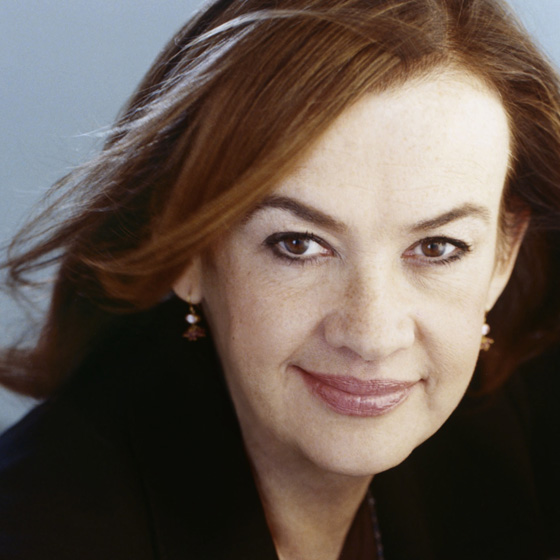Judy McGrath

JUDY MCGRATH: TV’s EXECUTIVE POP STAR
BY WAYNE FRIEDMAN
Back in the late 1980s, MTV’s Judy McGrath had what any executive with a creative director position might have in their office: A kitschy Michael Jackson desk lamp and a large, live iguana named Iggy Pop.
Flash forward two decades later, and now McGrath has some different points of identification in her big Times Square office, as the company’s most senior executive – chairman/CEO of MTV Networks. Gone is the Michael Jackson relic (it broke during the move). Gone too is Iggy – who sadly died before the shift to the new digs.
But this doesn’t mean her whimsy is gone. In fact, her ability to keep fresh, offbeat ideas popping is part of the reason the National Academy of Television Arts & Sciences will award her its Trustees Judy McGrath Emmy Award on Oct: 24.
“UNCONVENTIONAL THINKER”
“She is an unconventional thinker,” former longtime MTV and Viacom executive Tom Freston told Broadcasting & Cable in 2007; Freston worked with McGrath for more than two decades. “She’s a former bohemian who came to MTV for the best reason: love of music … and now she’s bloomed into a full-blown businessperson.”
She started out working as a copy chief and writer for the likes of Mademoiselle and Glamour – though her real desire was to write about music, especially for something like Rolling Stone magazine. Then along came this new cable music channel in 1981, offering her a job as a copywriter of on-air promotion. She rose through the young company, helping to launch the first MTV Video Music Awards show in 1984, still one of the network’s highest-rated TV shows. In the early 1990s she had a strong hand in developing The Real World, another franchise that continues today – with the show becoming perhaps the first “reality” TV series in the modern TV age?
Later in 1993, she was responsible for getting Beavis and Butt-Head on the air, an animated series known for its gross college-humor. Beavis and Real World helped transition MTV out of being just a channel of music videos.
In the late ’80s – when MTV was already a force with young consumers – McGrath reflected on what the network had accomplished in her short history: “You have to be openminded and make it up as you go along. MTV will continue to feed off culture and to feed into it. But if I could predict exactly where it’s going, I wouldn’t be working here anymore.”
Because of McGrath’s long stint at the channel, she played a crucial role in the development of MTV as a media brand. Moving up the ladder, she became editorial director, then senior vice president and creative director, then MTV Networks co-executive director in charge of network operations.
In 1994, she became president of MTV Networks. But – that’s when the real work started. In 1997 MTV’s bubble burst a bit, as the network suffered ratings erosion. All that told McGrath that consumers wanted something different, more of MTV’s roots. So she shifted back-to doing more music-related programming; MTV came up with its longtime popular afternoon music staple, Total Request Live, in 1998.
FROM THE OSBOURNES TO THE HILLS
But all this didn’t come at the expense of non-fiction programming. In the early 2000s. she was part of developing new hit shows like The Osbournes and Punk’d.
In 2002, McGrath was named president of the MTV Networks Music Group, in charge of all MTV networks, and, then in 2004, to her current post, chairman and chief executive officer of MTV Networks.
Now a new transition has started. MTV has been taking hits from the likes of new digital players – such as YouTube, Facebook, Twitter and MySpace. But MTV miraculously still finds ways to engage its audience, with shows like The Hills, a pseudo-reality show.
Against growing competition, Tom Freston, McGrath’s predecessor and the man who picked her for her current job, says her somewhat eccentric ways are more important than ever – especially in how she encourages young executives, talent, and even interns to present ideas.
Passionate and opinionated young MTV executives looking to make their mark are what McGrath is counting on for the future. Much of this comes from her upbringing in Scranton, Pa., where her mother was a teacher, and her father was a social worker, who laid the roots for her initial love of music. Her mother inspired her daughter to persevere, to have her own opinions, but, and most importantly, to respect others’ views as well.
Going forward, McGrath might ironically look to MTV’s past for answers to the future. She told Broadcasting & Cable in 1997: “We thought of [MTV] as a promise, and we very much wanted MTV to be meaningful despite the changing nature of pop music or the personalities who might come and go. It was not going to be static and marry one generation and grow old with it …. Our goal was to be the non-network network.”
Article courtesy of Broadcasting & Cable


